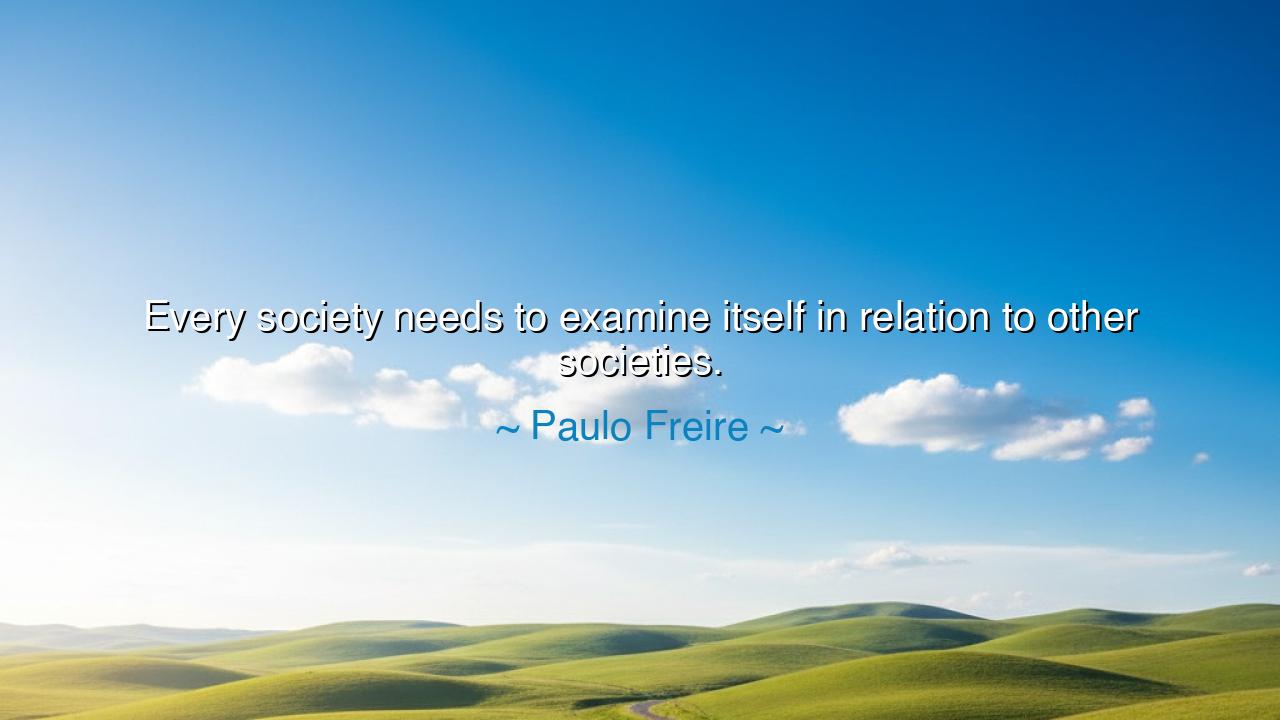
Every society needs to examine itself in relation to other






Hear, O children of wisdom, the voice of Paulo Freire, teacher of liberation, who declared: “Every society needs to examine itself in relation to other societies.” These words are not idle musings but a commandment for reflection. For no people, however proud, can claim perfection when they see only themselves. It is in the mirror of others that a nation discovers both its strength and its weakness, its wisdom and its folly.
The meaning is plain: societies are not islands. They breathe the same air, share the same earth, and wrestle with the same questions of justice, power, and humanity. Yet each builds its own customs, laws, and dreams. When one society dares to look upon another, it finds contrast and comparison. It learns what it has achieved and what it has neglected. Without such reflection, pride grows blind, and blindness breeds decay. To examine oneself in the light of others is not humiliation, but the path to growth.
History reveals this truth with clarity. In the age of the Renaissance, Europe rediscovered the wisdom of ancient Greece and Rome, examining itself against civilizations long past. This rebirth of art, science, and philosophy was not born from isolation, but from looking outward and backward. Similarly, in the 19th century, Japan, under the Meiji Restoration, examined the powers of the West. It did not merely imitate but transformed, blending foreign strength with native tradition, and in doing so rose swiftly to stand among the world’s great powers. Such is the fruit of Freire’s counsel: the courage to learn from others without losing oneself.
But there are also tragedies when nations refuse to look outward. China, in the later Qing dynasty, clung too tightly to its old ways, rejecting the lessons it might have drawn from rising societies around it. When foreign powers came with iron ships and modern weapons, the Middle Kingdom found itself humbled, its sovereignty carved away. So too with other empires that believed themselves eternal, yet crumbled because they would not examine themselves through the eyes of others.
Freire’s wisdom speaks not only to nations but to individuals, for what is a society but a gathering of souls? If a person judges himself only by his own measure, he may imagine he is righteous, though he walks in folly. But when he sees his reflection in others—their struggles, their virtues, their pains—then he learns humility, compassion, and the path to transformation. So too must peoples learn from one another, lest they fall into arrogance and isolation.
The lesson is clear: let every society look outward with open eyes, not to envy, not to scorn, but to learn. Let it ask: “How do others guard justice? How do they nurture the poor? How do they cherish knowledge and beauty?” And when it finds goodness, let it not be too proud to learn; and when it finds error, let it not be too arrogant to beware. In this way, the circle of nations may grow in wisdom together.
Therefore, O listeners, let us take Paulo Freire’s words into our hearts. In your communities, in your nations, in your own lives, do not measure only against yourself. Examine your ways in the light of others, and let that light reveal both your faults and your strengths. For only through such reflection does true growth come. And in this mutual learning, perhaps one day the societies of the earth may rise not in competition alone, but in harmony, each one brighter because it has seen the light of the other.
Thus remember: “Every society needs to examine itself in relation to other societies.” This is the counsel of humility, the path of wisdom, and the safeguard of the future. Embrace it, and you shall not walk in blindness, but in the shared light of humanity.






AAdministratorAdministrator
Welcome, honored guests. Please leave a comment, we will respond soon